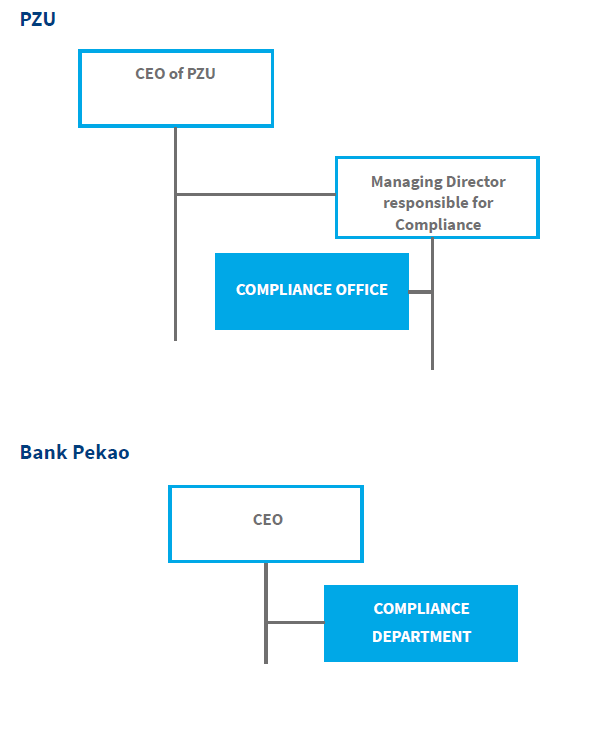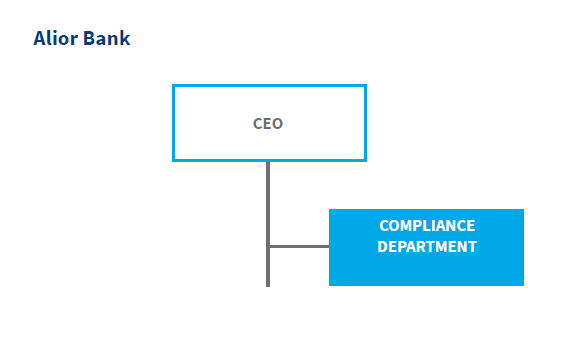Ethical foundations of doing business

 „The PZU Group is offering broadly defined financial and health services, which are developed to secure the needs of our customers. A major part of our products, in particular in the life insurance or investment area, has a long life cycle that often spans many years. As a result, clients' trust in our corporation is a key element determining good relations and consequently also transaction rates. This is why, as the PZU Group, we apply the highest ethical standards in all areas of contact with stakeholders that allow us to strengthen these relations. We believe that this approach is not only socially beneficial, but also represents a long-term investment in our reputation, which for the customers constitutes a guarantee of quality and security.”
„The PZU Group is offering broadly defined financial and health services, which are developed to secure the needs of our customers. A major part of our products, in particular in the life insurance or investment area, has a long life cycle that often spans many years. As a result, clients' trust in our corporation is a key element determining good relations and consequently also transaction rates. This is why, as the PZU Group, we apply the highest ethical standards in all areas of contact with stakeholders that allow us to strengthen these relations. We believe that this approach is not only socially beneficial, but also represents a long-term investment in our reputation, which for the customers constitutes a guarantee of quality and security.” [GRI 102-16] [GRI 103-2] [GRI 103-3]
The PZU Group’s ethical standards are laid down in the set out in the “Best Practices of the PZU Group”. Their aim is to develop the company’s consistent organizational culture in all key aspects of its operation. They define behaviors and conduct towards all stakeholders based on respect and trust. At the same time, this document serves as the common denominator of corporate culture in all of the Group’s entities. Thanks to the consistent compliance of our fundamental principles, all our activities and processes are carried out based on coherent assumptions, thus ensuring a high operating standard throughout the Group.
The “Best Practices of the PZU Group” have been adopted as a uniform model of the standards observed by all PZU Group entities, except for the Alior Group and the Pekao Group, which have adopted the “Code of Conduct in Alior Bank” and the “Code of Conduct in the Pekao Group”, respectively. The “Best Practices of the PZU Group” are a collection of values and principles by which employees should be guided. They form an obligation of conducting business in compliance with these values, the prevailing laws and regulations and the highest standards of conduct.
The “Best Practices of the PZU Group” describe the PZU Group’s values and the fundamental rules of conduct on the part of employees in reference to the following issues, among others:
- conflict of interest;
- handling sensitive information;
- corruption and gift policy;
- reporting ethical problems;
- rules of cooperation with contractors;
- disclosures.
Ethical culture
PZU Group’s ethical culture is developed in observance of the highest standards and in line with the needs of the Group’s entities, consequently taking account of the scale, character and type of their operation and local laws. The PZU Group furthers its ethical culture by creating systemic solutions at the level of PZU. As the parent company, PZU sets and develops standards of conduct, and then recommends their proliferation to other Group companies (save for the banks mają własne that have their own codes of conduct in place). These solutions are implemented in the various companies in keeping with the principle of relevance and suitability. The companies report compliance risk to PZU while respecting legally protected secrets.
The compliance risk management system in the PZU Group is based on the best market standards and proprietary solutions, while using a number of agreements between PZU entities and group policies. It is an integrated set of values, standards, tools, including procedures and regulations, supported by adequate communication with, and education of, employees. Individual companies in the PZU Group have a range of separate policies, procedures and practices in this area. The following elements constitute the overall system:
- values and rules of conduct, including the “Best Practices of the PZU Group”, “Code of Conduct in Alior Bank” and the “Code of Conduct in the Pekao Group”;
- procedures, policies and organizational arrangements;
- a system of reporting irregularities and potential malpractice (whistleblowing system);
- educational and communication activities addressed to employees and suppliers.
The obligation of abiding by the enacted standards pertains to all PZU Group employees, regardless of seniority or position.
[GRI 102-16]
| [GRI 102-16] PZU Group’s values |
Our promise to the client | Our promise to the employee |
| Stability |
|
|
| Honesty |
|
|
| Innovation |
|
|
| Responsibility |
|
|
[GRI 102-18]
Oversight and audit
The Compliance Department operates within PZU’s corporate structure as a separate and independent organizational unit. The person overseeing the key compliance function is the Managing Director on Regulations, who is also in charge of the Compliance Department and reports to the President of the PZU Management Board. The Compliance Department is responsible for systemic management of compliance risk, including compliance with the adopted standards of conduct. The Managing Director on Regulations, overseeing the Compliance Department, as well as the Director of the Compliance Department, have direct access to the members of the Company’s Management Board and Supervisory Board, to whom the compliance function reports. Reporting is done through monthly and annual reports for the Management Board and quarterly risk reports to the Supervisory Board’s Audit Committee and the Supervisory Board itself, as well as in the form of current information provided on an ad hoc basis to the members of the Company’s statutory bodies if the need arises. At the same time, every year the PZU Management Board approves a Compliance Analysis Plan for a given year, which specifies additional areas to be subject to analysis, also including the ethical matters.
Training and communication
PZU places great emphasis on instilling an awareness among employees that ethical values and compliance are of equal importance in the company doing business and employees discharging their daily duties.
Actions instilling an awareness of compliance:
- Employee training
Compliance standards are a permanent part of training for new hires. Employees may participate in additional topical workshops and training sessions regarding its anti-corruption policy, among others.
- Internal communication
Every quarter PZU employees receive the Compliance Bulletin, an inhouse magazine devoted to compliance-related topics.
Employees regularly receive Compliance Alerts. They are distributed in the form of e-mail messages to describe planned amendments to the law and new guidelines.
Ethics are also a part of compliance risk management on the following bases:
- on a systemic basis – practiced by the Management Board which is responsible, among other things, for setting the strategy and adopting policies related to compliance risk management and promulgating the adherence to standards of conduct in PZU, and by the Compliance Department which coordinates the compliance risk management process;
- on an ongoing basis – by the managers of various cells and organizational units in PZU in the area subject to their oversight.
[GRI 419-1]
No non-financial sanctions were recorded in PZU and PZU Życie in 2021 for compliance failure.
Ethics in subsidiaries
In Alior Bank ethical issues are managed in the Regulatory Compliance Department. This is a separate independent organizational unit reporting to the President of the Management Board of the Bank. The Regulatory Compliance Department prepares and presents to the Management Board and the Supervisory Board’s Audit Committee (quarterly) reports of compliance risk monitoring, including information on the identified compliance risk level in the individual area and the recommendations made to mitigate or eliminate the identified risk. In addition, the compliance unit’s annual action plan and annual report on compliance risk management are submitted to the Management Board, the Supervisory Board’s Audit Committee and the Supervisory Board.
Alior Bank abides by the rules of honesty and business ethics in all of the areas of its operations. It applies its “Compliance Policy”, which precisely lays down the rules for adhering to the law, market standards and internal regulations. The actions of Alior Bank as a public trust institution are based on the principles described in the “Code of Conduct in Alior Bank”. They are also enforced at the level of subsidiaries, i.e. Alior Leasing, Alior Finance and Alior TFI. The employees of other companies belonging to the Alior Bank Group are employed by the bank; consequently, they are obligated to act in accordance with the principles of the “Code of Conduct”.
The Code of Conduct in Alior Bank is a collection of the most significant principles and ethical standards governing the standards of conduct adopted by Alior Bank that must be followed by all members of the Bank’s governing bodies, employees and individuals hired by the Bank to carry out various banking activities. The purpose of the principles laid down in the Code of Conduct is to ensure a consistent and continuous improvement in the quality of services offered by Alior Bank and to build an internally more robust organization rooted in honesty, reliability and mutual trust. These values serve as the foundation for building an effective internal governance framework within the Bank, and the rules of conduct developed on their basis are aimed at shaping responsible and ethical attitudes among its staff. As a consequence, the Bank is capable of pursuing the significant undertaking of increasing the awareness of the importance of risk in the activities of this institution among the Bank’s employees.
Bank Pekao has a separate compliance unit: the Compliance Department. This department is organizationally and operationally independent and it reports directly to the President of the Management Board of the Bank. The Compliance Department’s reports on the execution of its tasks along with information on the level of the estimated compliance risk are presented to the Management Board and the Supervisory Board. The Bank supervises the compliance risk associated with the operations of its subsidiaries. Rolling out and applying compliance risk standards play an important role in creating goodwill, strengthening and protecting the good name of Bank Pekao and in strengthening public trust in the bank’s business and its position.
The “Code of Conduct in the Pekao Group” contains the most significant rules of conduct applicable to all individuals bound with Bank Pekao or any other member of the Bank Pekao Group by an employment relationship or other legal relationship of a similar nature, including members of the statutory bodies of the Bank or other Pekao Group companies. These rules apply to contacts with stakeholders: clients, business partners, representatives of local communities, the business environment and colleagues. They are expected to be followed in all areas of the Pekao Group’s business in order to ensure the highest quality of services rendered. Compliance with the provisions of the Code of Conduct is considered to be a fundamental duty of each and every employee of the Bank or of other members of the Pekao Group. In addition, a “Corruption Prevention Policy in the Bank Pekao S.A. Group” has been adopted by Bank Pekao. It governs conduct in the event of identifying and preventing potential “acts of corruption”.
Compliance units responsible for managing compliance risk also function in the remaining financial regulated companies of the PZU Group (including LINK4, TFI PZU, PTE PZU, TUW PZUW, international insurance companies).
PZU Group companies (including PTE PZU, TFI PZU, TUW PZUW, Lietuvos Draudimas, Balta, PZU Lithuania Life, PZU Ukraine, PZU Ukraine Life, PZU Finanse, LINK4, PZU Zdrowie, PZU Pomoc and PZU Centrum Operacji) have also adopted principles of ethics for the members of their corporate bodies to follow, i.e. the “Principles of ethics of the management board members in PZU Group companies”, the “Principles of ethics of supervisory board members in PZU Group companies who are not employees of a PZU Group company and who are not bound to a PZU Group company by some other contract of a similar nature” and “Principles of ethics of supervisory board members in PZU Group companies who are employees of a PZU Group company or who are bound to a PZU Group company by some other contract of a similar nature”. The principles of ethics applicable to members of corporate bodies serve the following purposes:
- they ensure that the members of the corporate bodies discharge their functions properly in compliance with the highest standards of conduct;
- they prevent the occurrence of a conflict of interest, in particular by counteracting the use of the position held to reap private gains;
- they specify the ethical standards, values and attitudes by which management board members should be guided.
Compliance and ethical management structure:


[GRI 206-1]
In 2021, four proceedings were pending against the PZU Group and its subsidiaries in terms of violating fair competition principles. (3 against Bank Pekao and 1 against PZU Pomoc).
